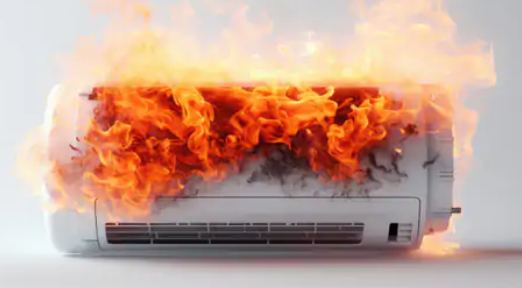KEEP YOUR ACs & REFRIGERATORS COOL IN SUMMERS TO AVOID AC Blast.

Recent incidents of fire and explosion in an AC or refrigerator in various cities highlight the importance of proper maintenance of electronic appliances. Many people lost their lives in these blasts. This is to understand how appliances work, and regular maintenance were key to preventing such accidents.
Electrical engineer says, in both ACs and refrigerators, a special fluid (refrigerant) circulates continuously. A pump (compressor) squishes the refrigerant, making it hot.
This hot gas travels outside in an AC (or to coils at the back in fridge) where it dumps heat and condenses into liquid. Then, the liquid refrigerant goes through a special valve that rapidly re duces its pressure and temperature, making it cold. This cold liquid travels to indoor coils (AC) or interior coils (fridge) where it absorbs heat, cooling the surrounding air or space. Finally, the refrigerant returns to the compressor to start the loop again. ACs and refrigerators use thermostats to control temperature and prevent overheating. They also have safety features to guard against electrical issues and component strain.
If an AC unit making grinding noises, vibrating, or emitting burning smell, it should be shut off immediately. One must contact a technician immediately. People are advised not to use AC at a stretch for more than five hours. Keep the AC and refrigerator running without threat it’s important to take care of them regularly.
For ACs, get a professional to check it once a year or every 600 hours running whichever is earlier, make sure the wiring is in good shape, filters are clean, and nothing is blocking the vents so that air can flow properly Also, use stabilizers to protect from voltage fluctuations.
If the AC coil gets clogged due to dirt, the normal flow of gas gets disrupted, causing the condenser to overheat and increasing the risk of fire. Refrigerators also, regularly checked for any signs of damage, especially on the compressor, and ensure there is good ventilation around it. Do not overload it with too much food, and check for refrigerant leaks.
For Air Conditioners For Refrigerators
| Do’s | Don’ts | Do’s | Don’ts |
| Servicing should be done annually. | No extension cords must be used. Plug directly into outlets. | Clean condenser coil annually. | Do not open the door frequently for long time. |
| Clean air filters every month and condenser coil in every 2-3months. | Don’t ignore unusual noise, burning smell or leaks. | Manually defrost it not frost free and replace water filters regularly. | Do not use sharp objects to remove frost as this can puncture refrigerant lines. |
| Keep AC temperature at 25°C. | Do not attempt any major repair yourself. | Avoid overloading to maintain airflow and efficiency. | Don’t ignore unusual noises, burning smells, or leaks. |
| Ensure proper ventilation around the outdoor unit | Don’t overload the circuits. | Pre-cool hot food before placing it in refrigerator. | Always call a technician for major repairs. |




